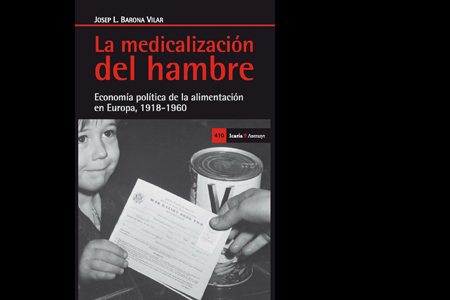
Economía política de la alimentación en Europa, 1918-1960. Icaria publishing house.
Author
Josep Lluís Barona is full university professor of history of Science (University of Valencia). He has been researcher in New York, Oxford, Bergen (Norway), Wolfenbüttel (Germany), Amsterdam and Florence. Leader of the group “Sanidad, Historia, Sociedad / Health in Society” (“Health care, History, Society / Health in Society”), his research topics are the economic policy of knowledge, health and international diplomacy, nutrition policies in Europe, health care in the Spanish War and the Republican scientific exile. His most recent books are: From Hunger to Malnutrition. The Political Economy of Scientific Knowledge in Europe, (1918-1960) (Brussels, 2012), The Problem of Nutrition (Frankfurt, 2010), El exilio científico republicano (The Republican scientific exile [Valencia, 2010]) and International Diplomacy and Public Health (2014). He collaborates in cultural journals and newspapers such as Mètode, El País, Levante-EMV, Le Monde Diplomatique and L’Espill.
Antrazyt collection
The Antrazyt collection intends to be an essential tool for university students, scholars, political and social actors, and for all those readers interested in delving into the thematic of each book. Antrazyt gathers papers on aspects of the historical or current social reality, and notes for the development of other possible models.
Summary
During the first half of the twentieth century, hunger gained political, social and scientific relevance. Experimental science revealed the role of nutrients and the clinical examination delimited the categories of malnutrition. The crisis caused by the Great War, the international conflicts, the reorganisation of the colonial map, the stock market crash in 1929 and the major economic downturn in the 30’s made nutrition to become a matter of State and a factor for international political stability. Scientific research went hand in hand with agricultural and public health policies, and provided the impetus for industrialisation and a new dietetic culture. Hunger, traditional regulator of the population together with the war, the economic crisis, natural disasters, poverty and epidemics, created a new context of international political and economic action to defeat it.
The current crisis reveals in Europe –and specially in Spain– new victims of hunger and malnutrition that are not on the political agenda. They are the result of the failure of the global political economy for coordinating the food production, the trade system, the price of basic foodstuff and the consumption. The inability of Capitalism as a global system, and the limited influence of the national and international, private and public initiatives to reach universal access to foodstuff –which requires the combination of techno-science, production, regulation and politics–, means that the problem remains nowadays, perversely, without solution.
















